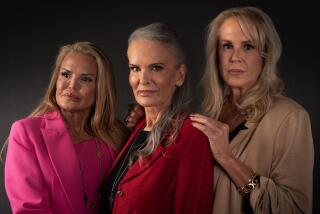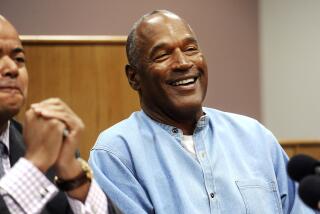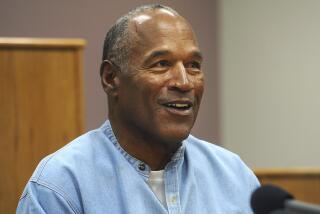Simpson Distraught at Murder News, Family Testifies : Trial: The defense launches its case with loving portraits of the defendant by his eldest daughter, mother and sister. Prosecutors treat the trio gently.
- Share via
Kicking off their defense of O.J. Simpson, his lawyers began Monday by putting his daughter, sister and mother on the stand, where all three painted loving portraits of him and told the jury that he seemed badly distraught by the news of his ex-wife’s death.
Arnelle Simpson, 26, who shares her father’s engaging smile and smooth charm, was the first defense witness, and all three relatives were called for a combination of substantive and emotional reasons. Under questioning from attorneys Johnnie L. Cochran Jr. and Robert L. Shapiro, the three women set out to instill a positive impression of their relative and debunk aspects of the prosecution case that suggest his guilt in the June 12, 1994, slayings of Nicole Brown Simpson and Ronald Lyle Goldman.
The defendant’s daughter, sister and mother all came to court wearing pale yellow--a visual show of solidarity that jury consultant Robert B. Hirschhorn likened to “wearing the O.J. team uniform.”
Arnelle Simpson’s testimony took up most of the day, and she was followed by her aunt, Carmelita Simpson-Durio, who echoed her niece’s description of O.J. Simpson on the day after the killings. Eunice Simpson, Simpson’s mother, was the final relative to testify, taking the witness stand after being led across the courtroom by attorney Carl Douglas, who helped the frail woman into her seat as the jury watched.
Eunice Simpson spent just 20 minutes on the stand in a brief but wide-ranging inquiry that featured testimony about her son’s childhood rickets, her family history of arthritis and O.J. Simpson’s demeanor on the evening after the murders. She was even allowed to describe her efforts to raise her children as a single mother and her religious convictions, a line of inquiry that Superior Court Judge Lance A. Ito eventually interrupted and gently urged Cochran to conclude.
After she returned to her seat, Cochran brought her a cup of water, which she sipped slowly.
The three women were called to the stand by a defense team eager to quickly attack the prosecution’s carefully built impression of Simpson as an abusive spouse who killed his ex-wife after years of escalating attempts to control her. Although none of the witnesses Monday addressed that directly, they all sought to portray Simpson as a caring, loving father, brother and son.
By contrast, all three portrayed a former friend of Simpson who testified against him as an unreliable witness who had been drinking on the night after the murders--a night in which he said Simpson confided in him about a dream of killing his ex-wife.
Prosecutors treated the three women gently, forgoing cross-examination of Eunice Simpson--a first for any witness in the Simpson trial--and handling Simpson’s daughter and sister gingerly.
Deputy Dist. Atty. Marcia Clark cross-examined Arnelle Simpson, gently but firmly questioning her about when certain telephone calls were made and gaining her acknowledgment that she was shocked and frazzled to be awakened by police officers before dawn the day after the killings. Because of that, Arnelle Simpson conceded that she could not be certain of some of the details of her recollections.
Jurors appeared taken with the young woman, following her testimony with rapt interest and carefully taking notes on certain aspects of her account. When Arnelle Simpson described calling Nicole Simpson’s mother to tell her of the slayings, 10 of the panelists wrote in their notebooks; when she testified that she never saw her father wear a black or blue-black cotton sweat suit such as the one prosecutors have suggested the killer wore, at least seven jurors seemed to write down that detail.
Time and again, she exchanged looks with her father, who beamed with evident pride at his oldest child. When his mother was on the stand, Simpson gazed at her, looking away shyly when she listed her children and when she said she had treated his rickets with “tender loving care.”
Daughter’s Testimony
In her early testimony, Arnelle Simpson gave the the jury a brief history of her family, an account peppered with reminders of her father’s fame. When asked about her age, for instance, she responded that she was born Dec. 4, 1968.
“Something unusual about that date?” Cochran asked.
“I was born the same day my dad won the Heisman Trophy,” she responded, drawing a warm look from her father.
Later, he grinned again as she told about the family’s habits in preparing to travel.
“There has always been an ongoing joke within the family that we would always say, Dad, you would have to get ready. And he would say [he] would get ready before you would be,” she said. “I would always prepare an hour before, and he will get dressed in the last 15 minutes.”
Smiling and laughing a bit, she added: “He has been doing this for years.”
Prosecutors have alleged that the reason Simpson was so harried when he met an airport limousine was because he had rushed home after committing the killings. Arnelle Simpson’s testimony was intended to suggest that her father always ran late.
Turning to the relationship between her father and Nicole Simpson--a relationship that prosecutors say underlies the brutal slayings--Arnelle Simpson painted a far more generous portrait of her father than have other witnesses.
According to Arnelle Simpson, even after her father and stepmother finally broke off a yearlong effort to reconcile--sometime around Mother’s Day of last year--he continued to care about his ex-wife.
When Nicole Simpson was sick, Arnelle Simpson said, her father “went over to her house one day to help . . . with the kids and to bring her some soup and medicine.”
That testimony is intended to rebut the suggestion that Simpson was incensed at the breakup of his relationship with Nicole Simpson and that he killed her when he had failed to control her. More generally, the defense wants the jury, which heard from a number of prosecution witnesses who described Simpson’s temper, to instead see the gentle and caring side of the former football star.
Rebutting Prosecution Points
Throughout her testimony, Arnelle Simpson offered a few nuggets intended to knock down the testimony of prosecution witnesses.
She said, for instance, that O.J. Simpson was “very upset, emotional, confused” when told of Nicole Simpson’s death. During Cochran’s questioning--which skipped back and forth from the days surrounding the slayings to details of the Simpson family history--the attorney returned four times to the issue of how Simpson appeared on the day after the killings.
Each time, Arnelle Simpson described her father as distraught and emotional--more so than she had ever seen him, she said.
After meeting with police and returning home to his Rockingham estate, Simpson was surrounded by friends and family, his daughter said, adding that he sat with his mother on a couch muttering at a television set as reports of the slaying came in.
“He was numb,” she said at one point.
Carmelita Simpson-Durio and Eunice Simpson both were at the house that evening, and they echoed Arnelle’s description of the defendant. Eunice Simpson said her son, obviously distraught, had sat with her and embraced her before going to bed that night. Carmelita Durio said her brother “was shocked, dazed. He was just there.”
Among those who were at Simpson’s house that evening was Ronald Shipp, a former Los Angeles police officer and longtime friend of the defendant who testified for the prosecution five months ago. In his testimony, Shipp said that Simpson had told him about a dream in which he contemplated killing his ex-wife.
Shipp’s testimony was allowed in over vigorous defense objections, and Simpson’s attorneys responded in part by launching a fierce attack on Shipp’s reliability. They continued that campaign with Arnelle Simpson, who testified that she saw Shipp, who admitted under oath to having once had a problem with alcohol, drinking a beer that evening at Simpson’s house.
“Did you see him have one drink or more than one drink or what?” asked Cochran, who, coincidentally, is Shipp’s cousin.
“I saw him have at least one drink,” she answered.
Later, however, she stopped short of endorsing a more damaging characterization suggested by Cochran, who asked whether she had ever seen Shipp that evening without a drink.
“I can’t say,” Arnelle Simpson responded.
She did say that she had never seen Shipp alone with her father that evening, though, further bolstering the defense suggestion that jurors should not trust Shipp’s testimony about the alleged dream.
And her description was backed up by the testimony of Simpson’s sister, who took the stand chiefly to describe Shipp’s demeanor. Questioned by Shapiro--who has long experience in drunk driving cases, including his successful defense years ago of F. Lee Bailey--Simpson-Durio described Shipp’s appearance that evening and said he appeared to be “high.”
Like her niece, Simpson-Durio, a demonstrative witness who spoke clearly and gestured lightly with her hands, added that she had never seen Shipp alone with her brother that night.
Under cross-examination by Deputy Dist. Atty. Christopher A. Darden, Simpson-Durio acknowledged that she could not be sure who went upstairs to her brother’s bedroom that night, but she also took advantage of an opening to provide a more complete description of Shipp’s appearance.
“His eyes were glassy,” she said. “He was muttering to himself and basically talking in circles.”
Again showing agreement among relatives, Eunice Simpson described Shipp as “spaced. . . . He didn’t appear natural.”
Gentle Cross-Examination
Handed the delicate task of questioning the defendant’s attractive, soft-spoken daughter, prosecutor Clark chose to emphasize a few points without badgering a young woman whom jurors seemed to like.
Clark opened her examination pleasantly, reminding Arnelle Simpson of their previous meeting across a courtroom during last summer’s preliminary hearing.
“We have done this before, haven’t we?” she asked, smiling pleasantly.
“Yes,” Arnelle Simpson responded with a nod. “We have.”
Clark gently homed in on a few areas where Arnelle Simpson’s answers had been vague or confusing. In response, the witness acknowledged that she could not be absolutely sure about some details such as the exact time that the police asked her and other residents of the Simpson estate to leave after detectives concluded that there might be evidence on the property.
Concluding her questioning, Clark posed a series of queries intended to remind jurors that Arnelle Simpson could not account for her father’s whereabouts during the crucial hour on June 12, 1994, and could not say what her father had been wearing at that time.
“You did not see what Mr. Simpson was wearing on the night of June the 12th, when he went out with Kato Kaelin to McDonald’s, did you?” Clark asked.
“No,” she answered.
After another set of questions, Clark asked: “You didn’t see the Bronco at 10 o’clock at night, is that correct, on June the 12th?”
“I don’t recall,” Arnelle Simpson said.
“And you did not see Mr. Simpson between 10 and 11 o’clock at night on June the 12th, is that correct?” Clark concluded.
“Yes,” she acknowledged.
Record Day
By the end of the day Monday, defense attorneys had presented the testimony of two more peripheral witnesses, a songwriter and an interior designer who testified about seeing Simpson in the days before the killings. That meant that a total of five witnesses testified in a single day, by far the quickest succession of witnesses during the Simpson trial.
“At this rate, you’ll be done by Friday,” Darden joked to Cochran as the attorneys left the courtroom.
“Maybe so,” Cochran responded.
In part, the faster pace was because defense lawyers are determined to project a confident image through their brisk presentation. But it also reflected the fact that none of the witnesses called Monday had information that directly bore on the murders.
The day’s penultimate witness, a songwriter named Carol Connors who came to court wearing a garment designed as a keyboard and who seemed to relish her moments on the witness stand, told the jury that Simpson and his girlfriend, Paula Barbieri, enjoyed “an exquisite romantic moment” at a benefit about a week before the murders. Outside court, Connors told reporters that she had seen Simpson stroking Barbieri’s face while Natalie Cole sang the song “Unforgettable.”
Similar testimony came from Mary Collins, an interior designer who said that Simpson and Barbieri were preparing to redecorate Simpson’s home--testimony that was intended to suggest to the jury that Simpson was not a jealous ex-husband pining for Nicole Simpson.
Testimony resumes today as the defense presses ahead with its case. In addition, Ito is continuing to wrestle with the release of transcripts of the investigations into various jurors who have been dismissed. He promised the release of those documents last week, but now it appears that some transcripts will not be made public until late this month at the earliest.
More to Read
Sign up for Essential California
The most important California stories and recommendations in your inbox every morning.
You may occasionally receive promotional content from the Los Angeles Times.













